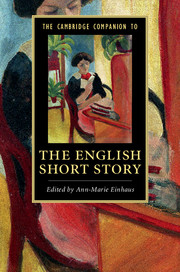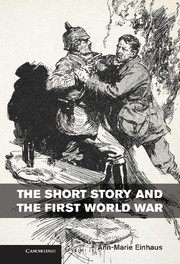31 results
Chapter 4 - The Continental European Literary Scene
- from Part I - Literary Contexts
-
-
- Book:
- A History of World War One Poetry
- Published online:
- 18 January 2023
- Print publication:
- 12 January 2023, pp 66-78
-
- Chapter
- Export citation
9 - War Stories: The Short Story in the First and Second World Wars
-
-
- Book:
- The Cambridge History of the English Short Story
- Published online:
- 17 November 2016
- Print publication:
- 14 November 2016, pp 152-167
-
- Chapter
- Export citation
Acknowledgements
-
- Book:
- The Cambridge Companion to the English Short Story
- Published online:
- 05 May 2016
- Print publication:
- 06 June 2016, pp xiii-xiv
-
- Chapter
- Export citation
Copyright page
-
- Book:
- The Cambridge Companion to the English Short Story
- Published online:
- 05 May 2016
- Print publication:
- 06 June 2016, pp vi-vi
-
- Chapter
- Export citation
Part III - Genres
-
- Book:
- The Cambridge Companion to the English Short Story
- Published online:
- 05 May 2016
- Print publication:
- 06 June 2016, pp 143-220
-
- Chapter
- Export citation
Glossary
-
- Book:
- The Cambridge Companion to the English Short Story
- Published online:
- 05 May 2016
- Print publication:
- 06 June 2016, pp xv-xxiv
-
- Chapter
- Export citation
7 - The short story in the early twentieth century
- from Part II - Periods
-
-
- Book:
- The Cambridge Companion to the English Short Story
- Published online:
- 05 May 2016
- Print publication:
- 06 June 2016, pp 101-114
-
- Chapter
- Export citation
Introduction
-
-
- Book:
- The Cambridge Companion to the English Short Story
- Published online:
- 05 May 2016
- Print publication:
- 06 June 2016, pp 1-12
-
- Chapter
- Export citation
Notes on Contributors
-
- Book:
- The Cambridge Companion to the English Short Story
- Published online:
- 05 May 2016
- Print publication:
- 06 June 2016, pp ix-xii
-
- Chapter
- Export citation
Part II - Periods
-
- Book:
- The Cambridge Companion to the English Short Story
- Published online:
- 05 May 2016
- Print publication:
- 06 June 2016, pp 71-142
-
- Chapter
- Export citation
Index
-
- Book:
- The Cambridge Companion to the English Short Story
- Published online:
- 05 May 2016
- Print publication:
- 06 June 2016, pp 225-232
-
- Chapter
- Export citation
Guide to further reading
-
- Book:
- The Cambridge Companion to the English Short Story
- Published online:
- 05 May 2016
- Print publication:
- 06 June 2016, pp 221-224
-
- Chapter
- Export citation
Contents
-
- Book:
- The Cambridge Companion to the English Short Story
- Published online:
- 05 May 2016
- Print publication:
- 06 June 2016, pp vii-viii
-
- Chapter
- Export citation
Part I - Contexts
-
- Book:
- The Cambridge Companion to the English Short Story
- Published online:
- 05 May 2016
- Print publication:
- 06 June 2016, pp 13-70
-
- Chapter
- Export citation

The Cambridge Companion to the English Short Story
-
- Published online:
- 05 May 2016
- Print publication:
- 06 June 2016
Chapter 1 - Canon, Genre, Experience, and the Implied Reader
-
- Book:
- The Short Story and the First World War
- Published online:
- 05 August 2013
- Print publication:
- 31 July 2013, pp 14-37
-
- Chapter
- Export citation
Chapter 4 - Negotiating Disaster in Popular Forms
-
- Book:
- The Short Story and the First World War
- Published online:
- 05 August 2013
- Print publication:
- 31 July 2013, pp 81-106
-
- Chapter
- Export citation
The Short Story and the First World War - Half title page
-
- Book:
- The Short Story and the First World War
- Published online:
- 05 August 2013
- Print publication:
- 31 July 2013, pp i-ii
-
- Chapter
- Export citation

The Short Story and the First World War
-
- Published online:
- 05 August 2013
- Print publication:
- 31 July 2013
Chapter 6 - Commemorative Narratives and Post-War Stories
-
- Book:
- The Short Story and the First World War
- Published online:
- 05 August 2013
- Print publication:
- 31 July 2013, pp 134-156
-
- Chapter
- Export citation



